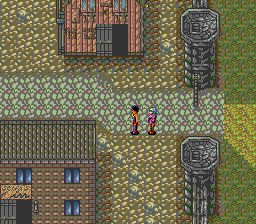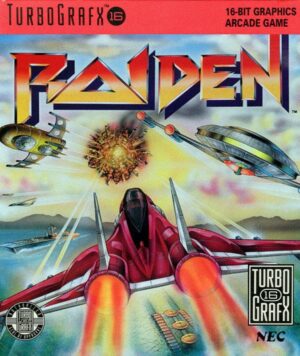Retro Replay Review
Gameplay
Babel’s gameplay offers a fresh twist on the classic turn-based JRPG formula by removing traditional experience points and tying character progression directly to story milestones. As you explore the three vast continents, you’ll engage in random encounters that feel both familiar and novel. Instead of grinding for EXP, your focus shifts to accumulating currency and uncovering plot threads, which in turn unlock new levels and abilities when you reach narrative checkpoints.
(HEY YOU!! We hope you enjoy! We try not to run ads. So basically, this is a very expensive hobby running this site. Please consider joining us for updates, forums, and more. Network w/ us to make some cash or friends while retro gaming, and you can win some free retro games for posting. Okay, carry on 👍)
The combat system itself is simple to pick up but allows for strategic depth. Each party member can wield multiple weapons—ranging from Zell’s trusty bike-mounted blade to Sefia’s enigmatic energy staff—and each weapon comes with its own special techniques. Deciding when to conserve your strongest moves versus unleashing them for a quick victory becomes an engaging puzzle, especially during boss battles that test your resource management and timing.
One of Babel’s standout features is the animated combat window. Rather than static portraits, you’ll see fluid, anime-inspired sequences that bring each character’s technique to life. These animations not only add visual flair but also provide visual cues for attack reach and enemy vulnerabilities. Combined with a straightforward menu layout, battles flow smoothly, even during prolonged dungeon crawls.
Graphics
Visually, Babel presents a striking blend of futuristic machinery and post-apocalyptic decay. The overworld map showcases sprawling cityscapes juxtaposed with barren wastelands, capturing the dissonance of a civilization reborn in an alien context. Subtle environmental details—rusted pipes, flickering neon signage, and overgrown ruins—contribute to a lived-in feel across the three continents.
Character sprites are crisp and expressive, with Zell’s rebellious posture and Alice’s protective stance immediately conveying their personalities. Sefia, meanwhile, is rendered with an air of mystery, her flowing attire and shifting energy effects hinting at deeper powers yet to be revealed. In battle, these sprites animate seamlessly, making each special attack a small spectacle rather than a static menu icon.
While Babel does not push the boundaries of modern gaming hardware, its art direction compensates with cohesive design choices. Color palettes shift subtly between regions—harsh reds dominate the industrial north, while lush greens and purples characterize the southern forests. This variety keeps exploration visually engaging and helps orient players as they traverse the world.
Story
The narrative premise of Babel sets the stage for an epic odyssey. Stranded in a parallel universe after a warp accident aboard the starship Agamemnon, humanity has forged new societies on three massive continents. Years after the crash, you join Zell, a plucky orphan whose daily routine of biking through desolate towns is disrupted when he and his friend Alice encounter Sefia, a mysterious girl on a mission that could determine the fate of this broken world.
Zell’s journey is both personal and universal. His desire to find a place of belonging resonates against the larger backdrop of human survival in an alien ecology. Alice’s role as a big sister figure adds emotional depth, grounding the story’s high-stakes events in genuine camaraderie. Sefia remains an intriguing wildcard, her true objectives revealed slowly through carefully placed cutscenes and dialogue exchanges.
Babel’s pacing strikes a fine balance between exploration, combat, and story progression. Narrative breaks are built into the structure of the continents, ensuring that players never stray too long without meaningful plot developments. Key revelations—such as the origin of the space warp technology and the cultural schisms among Babel’s inhabitants—are woven into side quests and main objectives alike, encouraging thorough exploration.
Overall Experience
Playing Babel feels like rediscovering the charm of classic JRPGs through a modern lens. The decision to eliminate experience point grinding frees you to engage more deeply with the characters and world, while the animated battle sequences prevent combat from becoming stale. Even veteran RPG players will appreciate the subtle innovations in progression and resource management.
The world of Babel is immersive without being overwhelming. The three continents each offer distinct atmospheres and challenges, which keeps the sense of discovery alive well into the late game. Varied enemy designs—from scavenger drones in the industrial zones to mutated wildlife in the overgrown forest—require you to adapt your tactics and weapon choices on the fly.
While the narrative occasionally leans on familiar tropes—lonely orphan hero, secretive ally, post-apocalyptic setting—Babel’s well-crafted dialogue and strong character relationships elevate it above cliché. The game’s conclusion provides satisfying closure while leaving room for future expansions or sequels. Overall, Babel is a thoughtfully designed JRPG that will appeal to both nostalgia seekers and newcomers eager for a story-driven adventure.
 Retro Replay Retro Replay gaming reviews, news, emulation, geek stuff and more!
Retro Replay Retro Replay gaming reviews, news, emulation, geek stuff and more!









Reviews
There are no reviews yet.